Safety week
This week, we’ve been learning about stay safe. We’ve had lots of visitors in Reception.
On Monday, we had a police officer come to talk about how they help us keep safe. They listened carefully and asked lots of super questions. Of course, some of us had to try on the uniform!
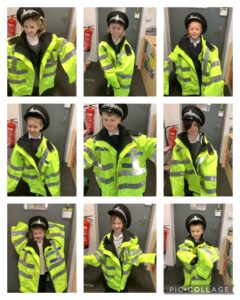
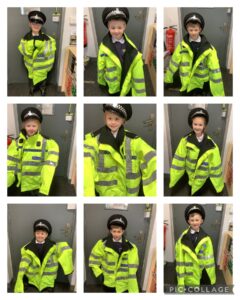
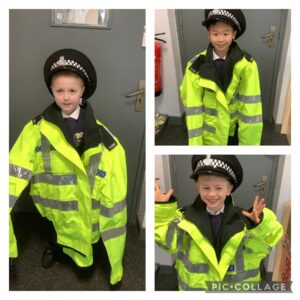
We also had some fire officers from Wetherby fire station come to visit us. The children were so excited when they saw the engine! Again, they listened carefully and asked lots of interesting questions.
AM – Is there a toilet on the fire engine?
JD – What do you use that for?
FL – What do you wear?
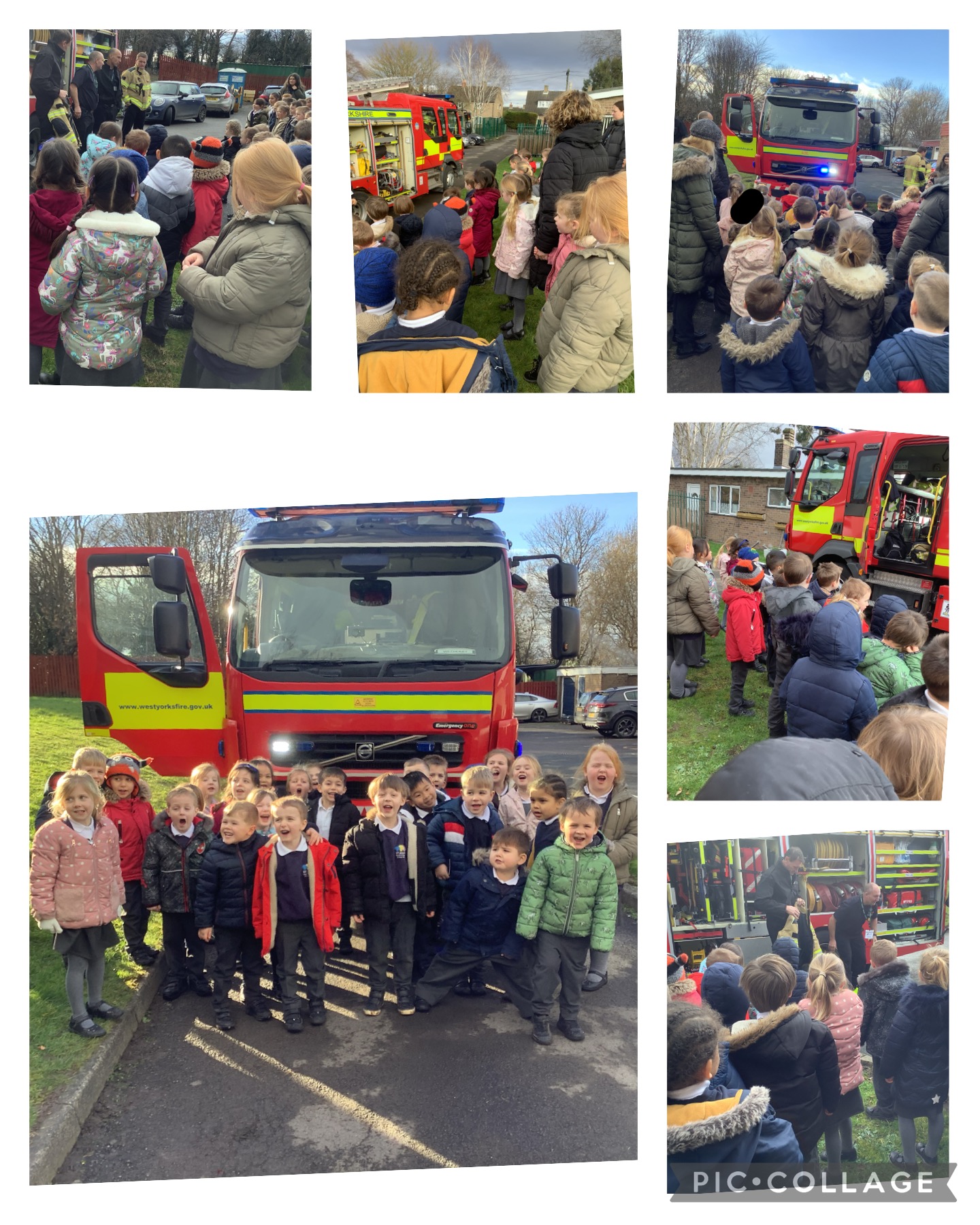
On Tuesday, Dogs Trust came to teach us how to be safe around dogs. Ask your child if they can remember the six important rules.
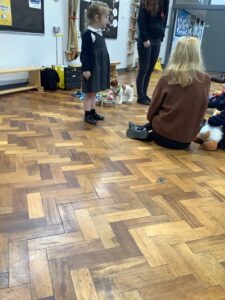
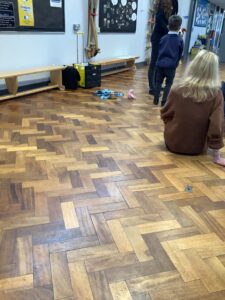
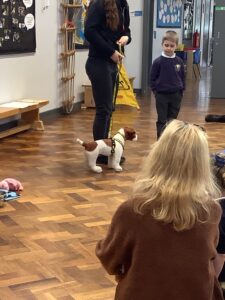
On Wednesday, Hand to Mouth, who are a Christian organisation came to visit us. We joined KS1 in the hall for a collective worship. After, we did a cutting and sticking activity called, Our Daily Bread.
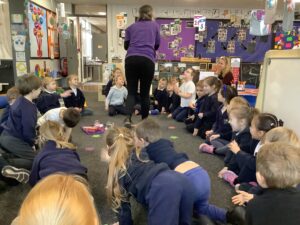
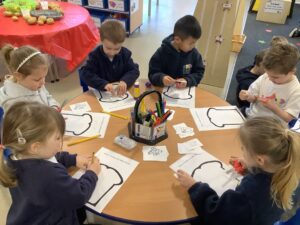
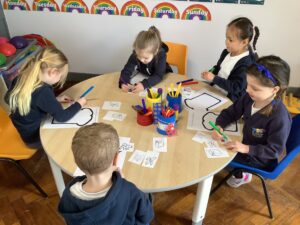
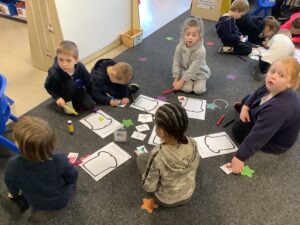
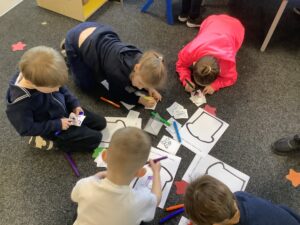
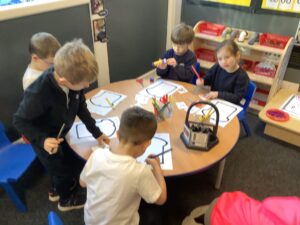 On Thursday, we had a road and pedestrian safety visit.
On Thursday, we had a road and pedestrian safety visit.
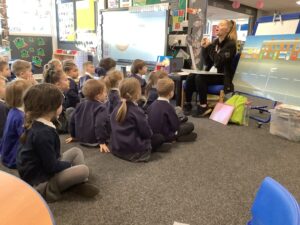

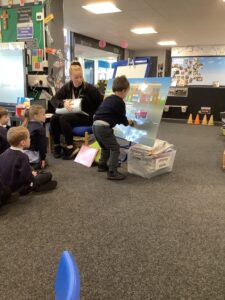 In literacy, our new focus story is Supertato. On Monday morning, the classroom door was covered in evil peas, vegetables were taped to the writing table and we found letter from the Evil Pea. On Thursday, the writing area was covered in evil peas! We found another letter from the Evil Pea and the vegetables were frozen!
In literacy, our new focus story is Supertato. On Monday morning, the classroom door was covered in evil peas, vegetables were taped to the writing table and we found letter from the Evil Pea. On Thursday, the writing area was covered in evil peas! We found another letter from the Evil Pea and the vegetables were frozen!
They made wanted posters to try and help capture the Evil pea. Some children had a go at drawing story maps.
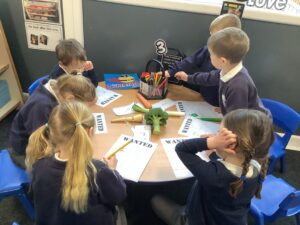
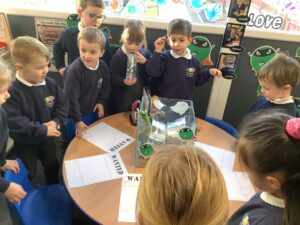
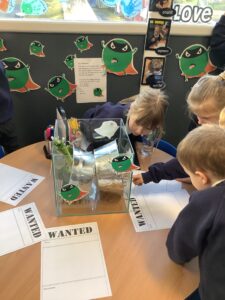
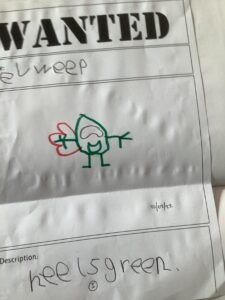
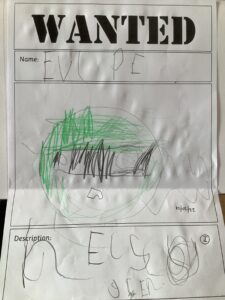

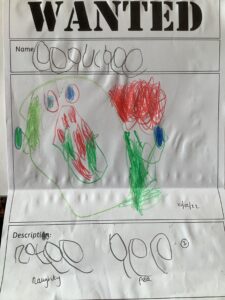
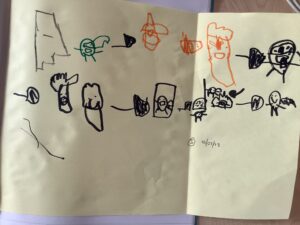
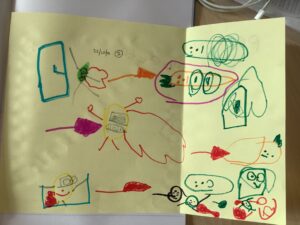
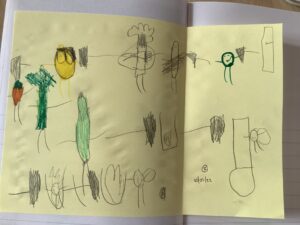
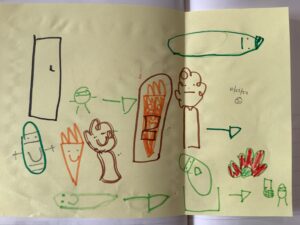
Reminders!
Parent-teacher meetings – Tuesday 15 & Thursday 17 February
Superhero day – Friday 18 February
Your child can come to school dressed as their favourite superhero.
Training day – Monday 28 February
Home-Link Challenge
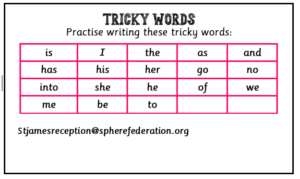
Staying Safe Week!
This week we have enjoyed safety week and participated in lots of activities helping us to stay safe.
We started the week by learning all about online safety, looking at how we can keep our personal information private and create secure passwords. We then enjoyed a visit from The Dogs Trust and learnt all about road safety during pedestrian training.
The children had lots of fantastic ideas about how to recognise risks and who to go to for support.
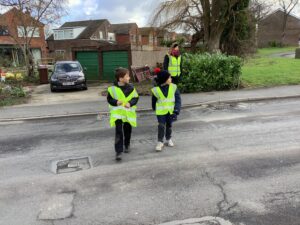
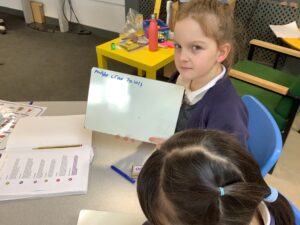
09.02.2022
This week, we are revisiting some spellings from this half term:
Year 1: Monday, Tuesday, Wednesday, Thursday, Friday, Saturday, Sunday
Year 2: after, again, any, bath, because, beautiful, behind, both, break, busy

11 February 2022
This week we have been learning about silent letters. Use the strategies we use in class to learn them for a test on Thursday 17th February.
- thistle
- whistled
- gnat
- gnawing
- know
- knock
- island
- aisle
- doubt
Living and learning – staying safe
This week, our living and learning statement is – I can assess my own risks.
We started by looking at the definitions of the words danger and safe.
What is danger? A cause of harm or injury
What is safety? Keeping free from harm or danger
The children were shown a risk ladder and had to sort activities based on their level of risk.
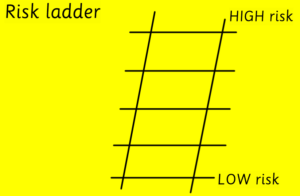
This led to some lovely discussions all around what is a low risk, medium risk or high risk.
“I think answering the telephone is a medium to high risk because you might not know who it is. You should let a grown up answer the phone,” said Emily.
“I think going online is a high risk because someone might try to talk to you when they shouldn’t. We shouldn’t tell our name or address to anyone online,” said Christian.
“I think taking a bath is low risk if your grown up is there to keep you safe,” said Beau.
“I think helping an adult in the kitchen is low risk because they are there to watch and help you,” said Shae.
At the end of the session we came up with 5 top tips to keep safe at home.
- Always ask a grown up for help when cooking in the kitchen.
- Never touch a hot oven.
- Tidy your toys so you or your family don’t trip over them.
- If you need to use scissors, never run with them, only walk and hold them by their sharp end.
- Always ask a grown up if you can go online and never give out your personal information.
11 February 2022
With it being Safety Week at school, this Talk Time brings together lots of the learning that has taken place.
I can show different ways to stay safe including how to seek help.
Because safety covers so many areas, your discussions could centre around these forms of safety as well as any others that you know of:
- Online safety (e-safety)
- Fire safety
- Road safety
- Electrical safety
- Water safety
For each type of safety, talk about different settings and examples of when you might be faced with risks and how you’d safely deal with them. In each situation, it’s crucial you discuss the help you’d need if something goes wrong. Imagine that you’re in different places and with different people in each scenario. Perhaps you’re with family, friends or on your own. Are there any services that you can contact?
Here are some R2s to help you stay safe:
- Think before you act.
- Assess the risks. Is it safe?
- If something goes wrong, again, think before you act.
- Who can help you and how can you reach them?
Science – Online Safety
In Science, we used the iPads to research the answer to some questions that we came up with, that were related to our topic – Seasonal Changes.
The two questions that the year 1 children were investigating were:
How many days are there in a season?
How does one season change into another?
In groups they worked together to find the answers.
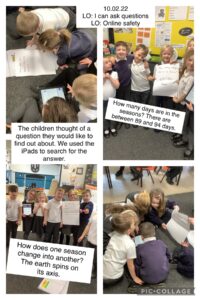
The Year 2 children had their own iPad to research the answer to their questions. We had some great questions:
What season is it in Australia now?
Can leaves change colour in summer?
How many leaves are falling from the trees now?
We read these top tips before going online and discussed how the lock at the front of the url meant it was a safe website to access.
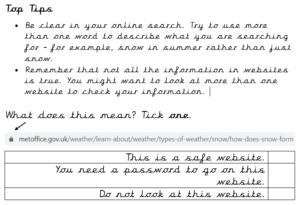
Safety Week
This week, we have had a few different visitors into school to talk to us about how to keep safe in different situations.
On Monday, we had a visit from the the firefighters. We talked about ways to stay safe at home and what their job involved when they were called out to help people in need.
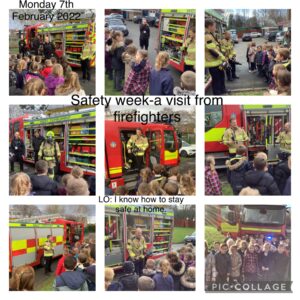
On Tuesday, we had a visit from the dogs trust. We found out about all the great work that the Dog’s Trust do to care for and rehome dogs.
It was interesting to learn about a day in the life of a dog at the centre.
We also got taught some great ways to keep safe around dogs to make us and the dog feel safe when playing, feeding or stroking a dog.
Did you know the dogs at the Dog’s Trust even go to dog school?
They learn tricks and skills to help them become great pets for their new owners.
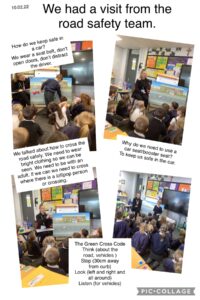
Today we had a visit from LCC road safety team. We were taught the Green Cross Code (think, stop, look and listen). We practised crossing an imaginary road safely, using the actions.
To help us when we are out near a road we were taught some top tips.
- Wear bright coloured clothing
- Make sure you are with an adult
- If possible, cross where there is a crossing e.g. pelican crossing.
Challenge: Can your child remember the Green Cross Code?
Sponsored Number Challenge 2022!
This year, we’re taking on a sponsored number challenge to raise money for our school charity, the RSPCA.
On Tuesday 15th January, everyone in school will be tasked with completing a number challenge. Children can be sponsored per correct answer or a full amount just for taking part!
Check out the video to find out more info!
Get sponsoring! Let’s raise as much money as we can for the RSPCA!
Division Facts
Just like your child does each day, we also practise our times tables each day at school! We frequently consider the inverse of multiplication- the opposite – division.
Check out this game and select ‘division facts’ to help your child to become more confident recalling these facts.
Click on the image to take you to division facts practice!